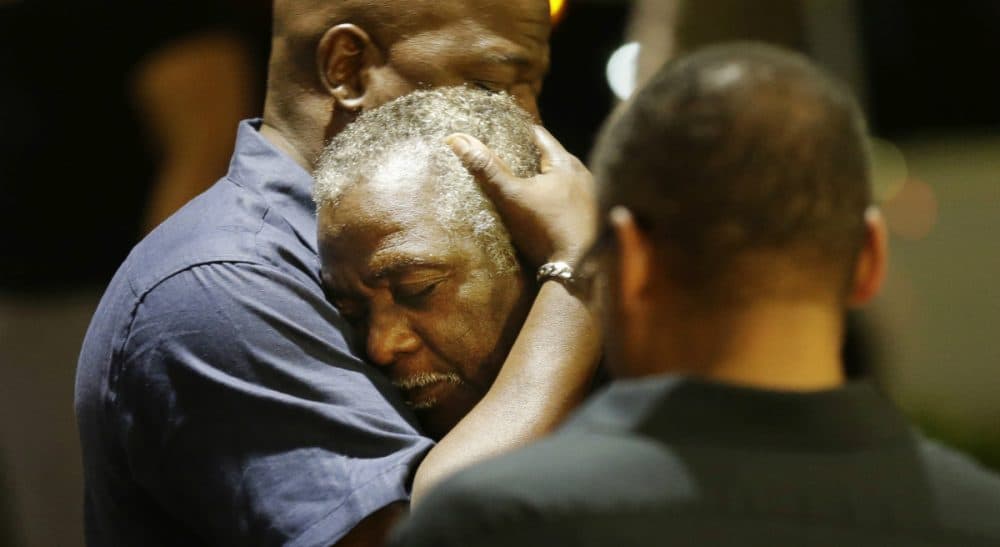Advertisement
In Charleston Shooting, Reason To Reconsider How We Classify Such Crimes

The violent murder of nine people in a Charleston church Wednesday night can be seen in many ways: as further evidence of the continuing grip of the sin of racism, as another indicator of the desperately poor resources we invest in mental health care, as yet more evidence of our over-weaponized society.
One way to see these events is to say that when the perpetrator is white, we label it a hate crime, but when the perpetrator is non-white...we label it terrorism.
But it also confronts us with an important problem of terminology. What is the difference between a hate crime and an act of terror? More to the point, is the difference we think we see actually unhelpful?
When Wade Michael Page attacked the Oak Creek gurdwara in August 2012, the violence he unleashed was quickly labeled a “hate crime.” But when Elton Simpson and Nadir Soofi, both ISIS sympathizers, tried to attack an event critical of Islam in Garland, Texas, this past May, the White House labeled it an act of terrorism. When three white men burned down the predominantly black Macedonia Church of God in Christ in Springfield on the night of Barack Obama’s first election to the presidency, prosecutors labeled it a hate crime. But when Faisal Shahzad was tried for the failed May 2010 attempt to plant a car bomb in Times Square, he was ultimately convicted for attempting an act of terrorism.
One way to see these events is to say that when the perpetrator is white, we label it a hate crime, but when the perpetrator is non-white, or Muslim, we label it terrorism. Another is to focus on the nature of the targets: When they are a specific class or group of people, whether defined religiously (Sikhs) or racially (African-Americans), we speak in terms of hate crime, while acts that are directed indiscriminately and without a specific group in view are described as acts of terrorism.
This may seem an innocuous way of drawing distinctions. It may, however, shape our thinking about the root causes that lead to violence in important — and not always wise — ways. Said simply, we see hate crimes as criminal acts committed by citizens, while we see terrorism as an act of war committed by aliens.
These ways of thinking bring with them significant consequences. We deal with criminals very differently from the way we deal with terrorists. Hate crimes are committed by criminals; they are pursued through law enforcement agencies. Suspects are accorded the protections of due process, both when they are apprehended and when they are tried.
Terrorists, by contrast, are regarded as enemies, not criminals. They are accorded none of the protections of due process, and, indeed, are not considered worthy of the protections of the laws — witness the continuing embarrassment of Guantánamo, or the descent of the United States into the use of torture in the wake of the 9/11 attacks.
The way we investigate, prepare for, protect against and prosecute acts of violence is significantly shaped by the way we describe them and think about them. And both of these categories have significant deficiencies. It can hardly be doubted, even on the basis of the scant evidence available as this is written, that the intent of Dylann Storm Roof, the suspect in the Charleston massacre, extended to terrorizing a whole community of people — particularly African-Americans. White supremacist movements, often glimpsed in the shadows behind the lone actors who perpetrate these events, have a long and sorry history of designing acts for specifically this purpose.
At the same time, an approach to terrorism that denies to perpetrators even the most basic protections of human rights undermines our credibility as a champion of the rule of law and deliberative due process. It places us in disturbing proximity to the codes of conduct of those who threaten us and seek to undermine the values of tolerance and equal justice that shape the aspirations of our culture.
...an approach to terrorism that denies to perpetrators even the most basic protections of human rights undermines our credibility as a champion of the rule of law and deliberative due process.
So it may be that what we need is a category somewhere closer to a point midway between these two different ideas. We underestimate the danger of domestic extremism, and the conspiratorial networks that support it, when we think of it as merely criminal; it is also, like terrorism, politically motivated. And we undercut our own legitimacy when we regard terrorism as a set of actions somehow outside the reach of the laws by which we wish to be governed.
In that middle is a clear, consistent and principled stance opposing violence for any purpose or in pursuit of any end. We should intensify our focus delegitimizing violence — whether on the playground or the streets of our cities, whether from citizens or non-citizens, whether from communities within or from sources outside our country.
This means conversation in our communities about the quality of our public discourse. It means deep and intentional education with people of all ages about the teachings offered by all our values systems, whether built on religious or secular foundations, about human frailty and the pointlessness of violence as a means to change and fulfillment. And it means aligning our justifiable pride in our freedoms with the recognition that true freedom exists only under conditions of reasoned restraint.
